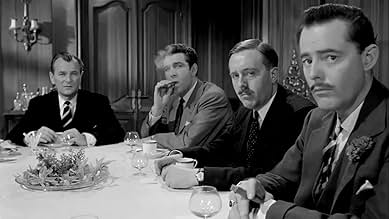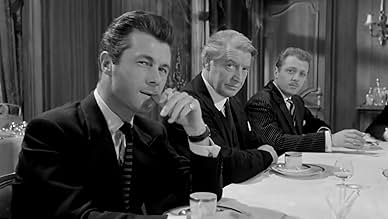CALIFICACIÓN DE IMDb
7.2/10
5.6 k
TU CALIFICACIÓN
Agrega una trama en tu idiomaA disgruntled veteran recruits a group of disgraced colleagues to perform a bank robbery with military precision.A disgruntled veteran recruits a group of disgraced colleagues to perform a bank robbery with military precision.A disgruntled veteran recruits a group of disgraced colleagues to perform a bank robbery with military precision.
- Nominada a1 premio BAFTA
- 1 premio ganado y 1 nominación en total
John Adams
- Police Constable in Final Scene
- (sin créditos)
- Dirección
- Guionistas
- Todo el elenco y el equipo
- Producción, taquilla y más en IMDbPro
Opiniones destacadas
It's very strange, but within the caper film genre, there are TONS of wonderful films....tons. Movies like "Rififi", "Grand Slam" and "The Italian Job" are all top entertainment...and "The League of Gentlemen" follows in this same tradition.
The film begins with Hyde (Jack Hawkings) sending an invitation to seven men. When the men all arrive at this dinner party, Hawkins shocks them all by telling them their sordid military histories. All served dishonorably and all are rogues...just the sort you'd like to recruit for some illegal acts. In this case, they will commit a very daring daytime bank robbery, but this is much later in the film. In the meantime, they all move in together and behave much like a precise military unit. Next, they have another, smaller but very daring raid to do so they'll have the proper equipment for the big robbery. How all this works together so precisely is why the film is worth seeing. Very well written, directed and acted--this is rousing entertainment from start to finish. It also offers enough novelty to make it different enough from these other films.
By the way, an interesting notion is the character played by Kieron Moore. Though never explicitly stated, it sure is apparent he's supposed to be gay. And, speaking of this, look for a tiny role played by a young Oliver Reed--a very, very stereotypically gay role...VERY.
The film begins with Hyde (Jack Hawkings) sending an invitation to seven men. When the men all arrive at this dinner party, Hawkins shocks them all by telling them their sordid military histories. All served dishonorably and all are rogues...just the sort you'd like to recruit for some illegal acts. In this case, they will commit a very daring daytime bank robbery, but this is much later in the film. In the meantime, they all move in together and behave much like a precise military unit. Next, they have another, smaller but very daring raid to do so they'll have the proper equipment for the big robbery. How all this works together so precisely is why the film is worth seeing. Very well written, directed and acted--this is rousing entertainment from start to finish. It also offers enough novelty to make it different enough from these other films.
By the way, an interesting notion is the character played by Kieron Moore. Though never explicitly stated, it sure is apparent he's supposed to be gay. And, speaking of this, look for a tiny role played by a young Oliver Reed--a very, very stereotypically gay role...VERY.
Jack Hawkins, excellent as always, heads a superb cast in this marvelously entertaining look at the moral decay of Britain's upper classes in the post-war period. Some of Britain's greatest film talent was at work on this project, including screenwriter Bryan Forbes, director Basil Dearden, and cinematographer Arthur Ibbetson. If you want to see the granddaddy of caper films, this is it. It's also your chance to see Oliver Reed playing a flaming queen: believe it or not!
A British army colonel, pensioned off and embittered, assembles a motley group of specialist, criminal and deviant ex-officers who share his bitterness. He has in mind a bank robbery. They arm themselves, courtesy of their former employer, then execute the robbery impeccably, right in the centre of the City of London. The bags of loot are filled, but, at the pictures, crime seldom pays....
That this film has been reviewed as a comedy demonstrates, once again, that British and American are two cultures disguised by a common language. The humour here, of that characteristically British sardonic kind, is incidental to a drama of frustration, disappointment and inadequacy. The humour is just the way the British speak.
The clever and low key "raid" on the army training centre is finely done. So much so that it overshadows the robbery itself and therefore slightly unbalances the action.
This is one of those films, craftsmanlike and enjoyable, yet not desperately exciting, that finds its greatest value precisely in being a period piece. The League of Gentleman is a fascinating social document. Made in 1959, it catches the moment in British history when, as its Empire dissolved, the social infrastructure that supported it and that had made Colonel Hyde what he had been, also disintegrated. This aspect could almost have been deliberate, explaining the very long opening sequence (another unbalancing factor) that introduces us to the seven main characters. There are shockingly frank moments: the honourable man with the overtly promiscuous wife; the gigolo; the religious fraudster (or pervert - the message is obscured); another of the heroes an "other man", a homosexual; the pressure of life in a small house with a loud television set. So, too, the casualness with which machine guns are used in a robbery by men trained in the code of gentlemen. The dull and seedy presentation of Hyde's home and base, large but far from grand, is further evidence of the decline of his class. So, too, a robbery that was intended as a hymn to the effectiveness of military planning, brought to naught by one stupid mistake and a small boy.
Yet this is not a sententious film, their is no preaching, none of that British nostalgia for the old ways, but almost a respect for the robbers and a recognition that life had to become more ruthless as a stiff society began to flex. How it was elsewhere, I do not know, but this watchable film will show anyone what was happening in Britain just before the Sixties began to swing.
That this film has been reviewed as a comedy demonstrates, once again, that British and American are two cultures disguised by a common language. The humour here, of that characteristically British sardonic kind, is incidental to a drama of frustration, disappointment and inadequacy. The humour is just the way the British speak.
The clever and low key "raid" on the army training centre is finely done. So much so that it overshadows the robbery itself and therefore slightly unbalances the action.
This is one of those films, craftsmanlike and enjoyable, yet not desperately exciting, that finds its greatest value precisely in being a period piece. The League of Gentleman is a fascinating social document. Made in 1959, it catches the moment in British history when, as its Empire dissolved, the social infrastructure that supported it and that had made Colonel Hyde what he had been, also disintegrated. This aspect could almost have been deliberate, explaining the very long opening sequence (another unbalancing factor) that introduces us to the seven main characters. There are shockingly frank moments: the honourable man with the overtly promiscuous wife; the gigolo; the religious fraudster (or pervert - the message is obscured); another of the heroes an "other man", a homosexual; the pressure of life in a small house with a loud television set. So, too, the casualness with which machine guns are used in a robbery by men trained in the code of gentlemen. The dull and seedy presentation of Hyde's home and base, large but far from grand, is further evidence of the decline of his class. So, too, a robbery that was intended as a hymn to the effectiveness of military planning, brought to naught by one stupid mistake and a small boy.
Yet this is not a sententious film, their is no preaching, none of that British nostalgia for the old ways, but almost a respect for the robbers and a recognition that life had to become more ruthless as a stiff society began to flex. How it was elsewhere, I do not know, but this watchable film will show anyone what was happening in Britain just before the Sixties began to swing.
This 1959 (or 1960) film shares the same title as the 1990's comedy about weird northern folk, but is a far more savage satire of decay in the establishment.
A redundant Colonel recruits a unit of marginally more corrupted subordinate Army officers, to stage an American Style heist, based on a US pulp fiction novel. Very few of the characters would initially be associated with the establishment. Their past failings include treason, war-crimes and negligence resulting in deaths.
Jack Hawkins (Colonel Hyde) knits the characters together over the course of the film. By reinventing a form of army discipline the characters appear to rediscover their aplomb.
The actual robbery is almost incidental, occupying ~ 10% of the film.
My real fascination was with the development and interaction of the characters. Even 40 years on their callousness is at times shocking and the 'Blame Ireland' example of scapegoating still resonates, especially in the context of the characters' personal failures in other theatres of the ex-empire.
The film is nearly 2 hours long, but seemed much shorter. Post war film of the City of London (and elsewhere) before 60s redevelopment is a bonus.
A redundant Colonel recruits a unit of marginally more corrupted subordinate Army officers, to stage an American Style heist, based on a US pulp fiction novel. Very few of the characters would initially be associated with the establishment. Their past failings include treason, war-crimes and negligence resulting in deaths.
Jack Hawkins (Colonel Hyde) knits the characters together over the course of the film. By reinventing a form of army discipline the characters appear to rediscover their aplomb.
The actual robbery is almost incidental, occupying ~ 10% of the film.
My real fascination was with the development and interaction of the characters. Even 40 years on their callousness is at times shocking and the 'Blame Ireland' example of scapegoating still resonates, especially in the context of the characters' personal failures in other theatres of the ex-empire.
The film is nearly 2 hours long, but seemed much shorter. Post war film of the City of London (and elsewhere) before 60s redevelopment is a bonus.
What a wonderful short review from Stewart Naunton, above! I thought this was just a sleeper movie that only I appreciated.
The gentlemen in question are men who were very good in the War but not very successful or appreciated between wars. What is more appropriate than that they extract a long-deserved payment by plotting and executing this intricate caper?
This is a movie with a deep moral message. The robbers are in the right, and it is a real shame that these heroes, for heroes they are, have to get nabbed at the end of the film. By rights they should not only have got away with their caper, they should have taken back their country from the small minds and souls that had commandeered it.
"You Never Had It So Good," was Macmillan's slogan in '59, but these ex-officers seem to have missed out on the fun everyone else is having. They have been shabbily treated by their country and you just have to root for them as they recover their talents and daring.
The movie makes a good companion piece for Basil Dearden's 1961 film 'Victim', which is thematically dissimilar but very much the same in appearance and feel.
The gentlemen in question are men who were very good in the War but not very successful or appreciated between wars. What is more appropriate than that they extract a long-deserved payment by plotting and executing this intricate caper?
This is a movie with a deep moral message. The robbers are in the right, and it is a real shame that these heroes, for heroes they are, have to get nabbed at the end of the film. By rights they should not only have got away with their caper, they should have taken back their country from the small minds and souls that had commandeered it.
"You Never Had It So Good," was Macmillan's slogan in '59, but these ex-officers seem to have missed out on the fun everyone else is having. They have been shabbily treated by their country and you just have to root for them as they recover their talents and daring.
The movie makes a good companion piece for Basil Dearden's 1961 film 'Victim', which is thematically dissimilar but very much the same in appearance and feel.
¿Sabías que…?
- TriviaJack Hawkins was ill with cancer during filming. Shooting was shut down for several days.
- ErroresAs Col. Hyde is showing the movie of the exterior of the bank that they will rob he tells his cohorts, "This is the view of the bank that you will see three weeks from today, gentlemen." Sure enough, during the events just before the actual robbery: As the guard opens the rear door of the armored truck, the same-dressed man with a newspaper in his overcoat pocket walks past and, as the guards put the boxes on the flatbed truck, the same two women in light overcoats walk past.
- Citas
Major Race: Is that your wife?
Lt. Col. Hyde: Yes.
Major Race: Is she dead?
Lt. Col. Hyde: No, no. I regret to say the bitch is still going strong.
- ConexionesFeatured in Un plan brillante (2007)
Selecciones populares
Inicia sesión para calificar y agrega a la lista de videos para obtener recomendaciones personalizadas
Detalles
- Fecha de lanzamiento
- País de origen
- Idioma
- También se conoce como
- The League of Gentlemen
- Locaciones de filmación
- Productora
- Ver más créditos de la compañía en IMDbPro
Taquilla
- Presupuesto
- GBP 192,000 (estimado)
- Tiempo de ejecución
- 1h 56min(116 min)
- Color
- Mezcla de sonido
- Relación de aspecto
- 1.66 : 1
Contribuir a esta página
Sugiere una edición o agrega el contenido que falta


































